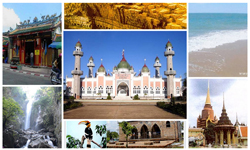The Man Behind the Draft Bill for Pattani Maha Nakhon (Greater Pattani City) Model.
 By Pratya Toh-e-tae
By Pratya Toh-e-tae
It should be noted that the idea of the Nakhon Pattani or Pattani City model of local administrative body for the violence-prone deep South proposed recently by General Chavalit Yongchaiyudh, chairman of the opposition Puea Thai party, has not only sparked off a series of public discussions about the matter but it has also resulted to the drafting of a bill for a new model of local administration.
The bill, named the Pattani Maha Nakhon administration regulations, was drafted by Mr Akkacha Promsoot, a member of the Political Development Council in collaboration with the King Prajadhipok’s Institute.
In a recent interview with the Isra news agency, Mr Akkacha said that the bill had its origin from discussions within a small circle of people and members of the civil society network about the situation in the deep South and how they could contribute to resolve the conflict. The discussions, he said, have resulted to the drafting of the bill advocating the Pattani Maha Nakhon model which is to be presented to all stakeholders for their opinions to be input for the final draft of the bill.
Mr Akkacha explained that the draft bill had incorporated the outstanding features of several models of special local administrative body in Thailand, mainly the Bangkok Metropolitan Administration which, he noted, is most relevant with the conditions in the deep South. Under the BMA, Bangkok and its peripheries are merged together under one single entity and, likewise, the Pattani Maha Nakhon seeks to merge together the provinces of Yala, Pattani and Narathiwat and four districts of Songkhla province under one legal entity.
Initial reactions to the proposed model of Pattani Maha Nakhon were mixed although most people agreed with it because its contents were similar to those appeared in earlier drafts, particularly the one proposed five decades ago by Haji Sulong Tohmena, the late father of former MP Den Tohmena. Unfortunately though, the bill was rejected by the government then which was not so democratic, said Mr Akkacha.
“Those who disagree with the draft bill are concerned that it may lead to the separation of a new state from the kingdom. Others question how the Thai Buddhists in the areas will live,” said Mr Akkacha who, however, insisted that the proposal was just a model which needs to be further defined and finetuned with the inputs from all stakeholders to be taken into consideration.
He expressed confidence that the final draft bill would be accepted for consideration by the government and the parliament despite the initial disapprovals.
Under article 163 of the Constitution, the people have the right to propose their own bill to the parliament provided that the bill has the backing of at least 10,000 supporters. And this may be the channel through which the people in the three southernmost provinces will use in pursuit of a model of self-determination will correspond with their way of life, their religious faiths and customs.
